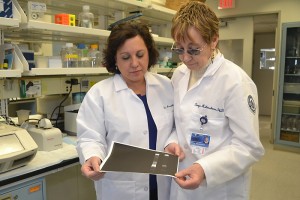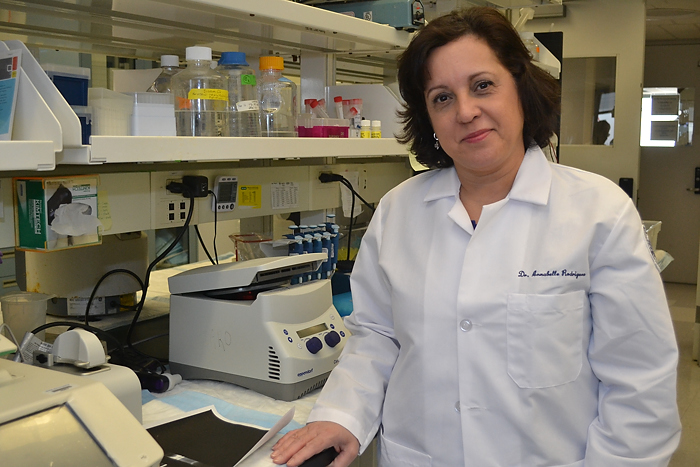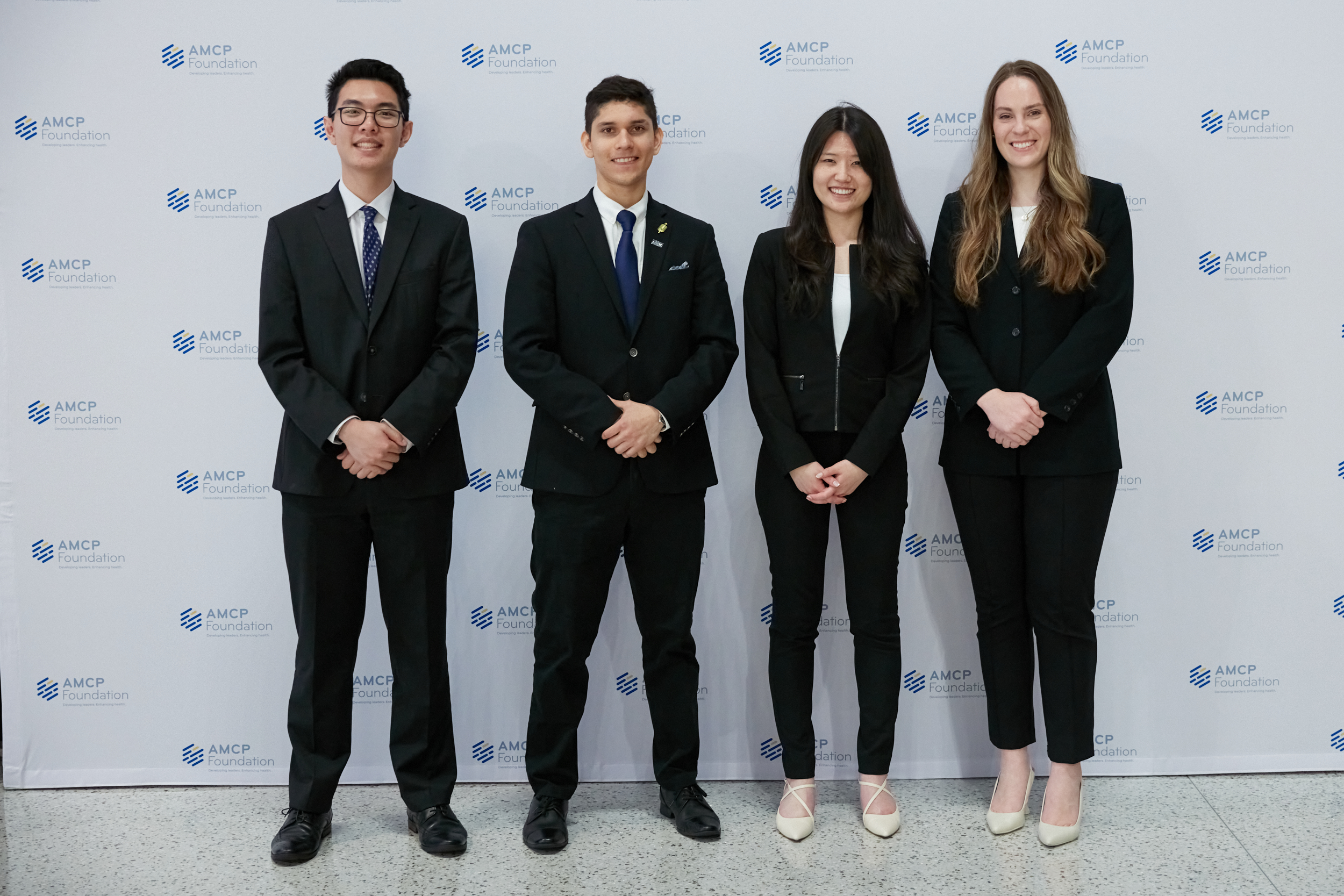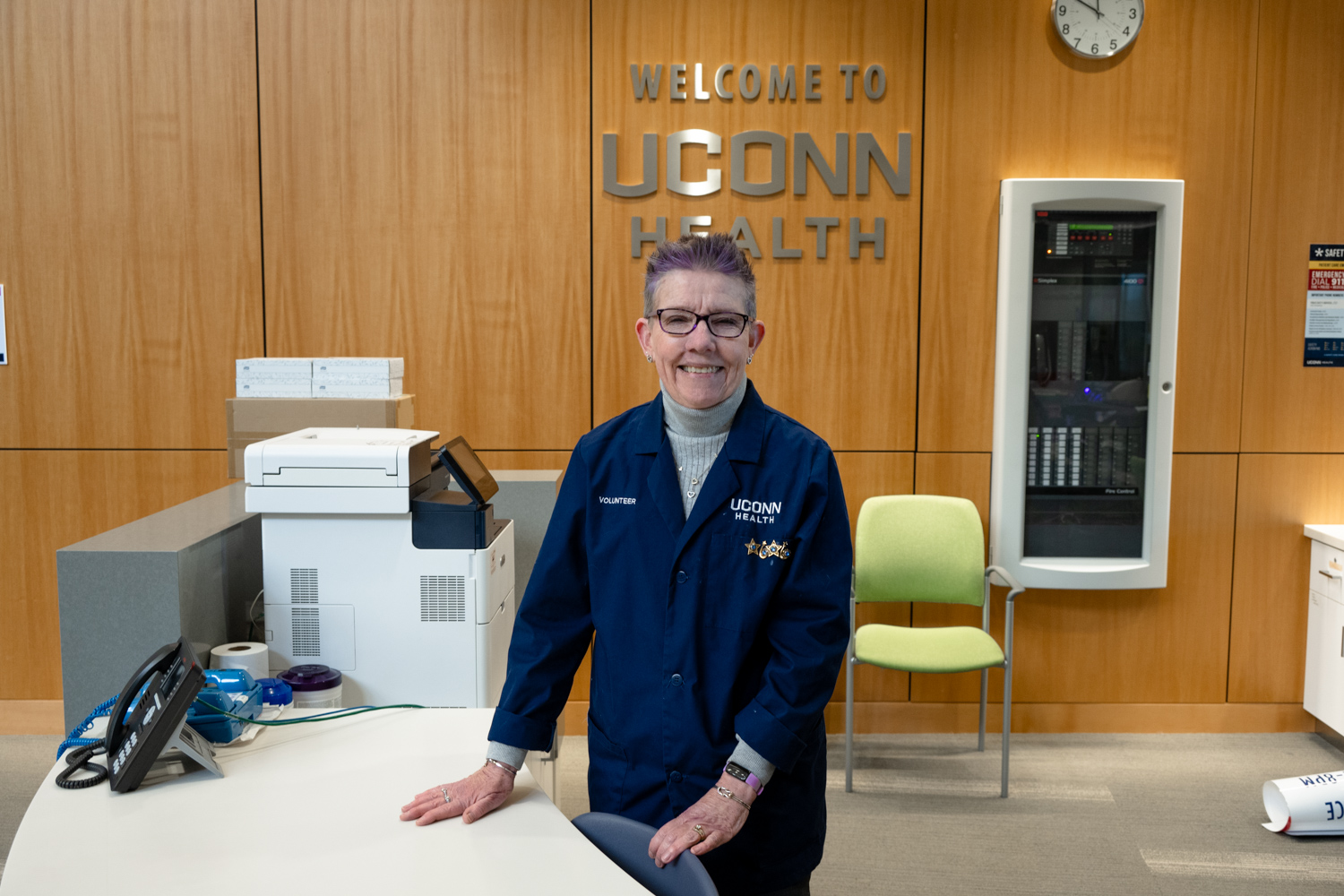
While her research as a physician scientist is by necessity grounded in facts, Dr. Annabelle Rodriguez-Oquendo believes the path that brought her to the University of Connecticut Health Center was very much guided by destiny.
Rodriguez-Oquendo, professor of cell biology and recipient of the Linda and David Roth Chair in Cardiovascular Research, is performing groundbreaking studies of a genetic link between healthy HDL cholesterol, heart disease, and infertility in women. She came to the Health Center from Johns Hopkins University School of Medicine this past fall, led by a series of coincidences and opportunities.
As an endocrinology specialist at Hopkins, she was performing her research while overseeing a program to establish treatment protocols for diabetes patients. “But my research was moving in a different direction, and I had to choose where I would put 100 percent of my efforts,” she says.
She had met Linda Shapiro, UConn associate professor of cell biology and director of UConn’s Center for Vascular Biology, while they both were reviewing National Institutes of Health (NIH) grant submissions, and she became intrigued by the commitment of the school and state leaders to the biosciences and genetics research.
She also had been corresponding with a scientist at the Genomic Institute of Singapore, Yijun Ruan, whose assay research supported her study of the genetics of the mutation she discovered. She then learned that Ruan recently joined The Jackson Laboratory for Genomic Medicine and will relocate his lab to the research facility the company is building on the Health Center’s Farmington campus.
Her research is also linked closely to fertility, so she was pleased to hear that the Health Center had a large and successful fertility clinic. “This was a good match for me for many reasons,” she says of her decision to come to Connecticut despite other attractive offers. “Sometimes the universe just lines up for you, and you have to go with it. It’s like floating down a river and you go where the water takes you. I think I was meant to come here.”
Groundbreaking Research Continues
At Hopkins, Rodriguez-Oquendo’s research led to commercialization rights for molecular diagnostics to help assess cardiovascular risk in men and women as well as infertility risk in women. At UConn, she already has successfully procured a grant to continue probing the role of a genetic mutation that results in heart disease and infertility in women who paradoxically exhibit high levels of “healthy” HDL cholesterol.
“I was always interested in cholesterol and HDL, how healthy cholesterol can leach cholesterol out of cell walls like a vacuum,” she says. Her work suggested that variations within the SCARB1 gene, connected to HDL levels, are associated with heart disease risk as well as hormonal and fertility problems in women. Studies have found promising results in reversing the effects of this mutation using a cholesterol-lowering drug.
Rodriguez-Oquendo feels strongly that researchers need to communicate to the general public how their research, which is often highly technical, can directly benefit a person. In her case, the goal of her discoveries is the development of methods to diagnose and, ultimately, treat heart disease and improve a woman’s ability to conceive.
She is an enthusiastic proponent of Bioscience Connecticut, Gov. Dannel P. Malloy’s plan to jumpstart Connecticut’s economy by supporting bioscience research, innovation and commercialization, which would create jobs and bring revenue to the state while furthering a greater cause. “What really intrigues me is what the governor wants to accomplish, which is to encourage discoveries to improve human health. That’s the mission of researchers, to make discoveries that lead to diagnostic tests that then result in therapeutics.”
This is the promise of human genome sequencing and personalized medicine, and it is what drives Rodriguez-Oquendo in her work. “By matching the genetic code, we can figure out biologic pathways that can lead to drug discoveries and other therapies.”
Perfect Partnerships
Stars have aligned for the modest, quiet-spoken Rodriguez-Oquendo in other ways as well. Born in Hawaii to parents of Puerto Rican descent with her father in the military, she was raised in New Jersey, receiving her undergraduate degree at Rutgers and her medical education at New Jersey Medical School.
It was postgraduate training at the Medical College of Pennsylvania, internationally known for research into cholesterol and metabolism, that sparked her interest in the research aspects of medicine. That desire was reinforced when she was expecting her first child and was given a choice of taking either two weeks off from medicine, or a year. She chose the year, and during that time was given an opportunity to work several days a week in a lab as a bench scientist. “It was a transformative experience in my career,” she says. “That’s how I learned how science is done.”
She and her husband, Ray Oquendo, who has worked for over 30 years in IT support services for IBM, have been married for 30 years and have a 27-year-old daughter and a 24-year-old son. “Male or female, partnerships are tested when it comes to careers,” she says. “It’s really important to find the right partner who will champion your cause while you champion his.”
Today she is enjoying professional collaborations she has found at UConn, including a grant she is writing with Dr. John Nulsen, medical director of the Center for Advanced Reproductive Services at the University of Connecticut Health Center. “Our goal is to show how we can impact people’s lives, to make our research real,” she says. “It’s nice to be in a very rich environment where that is a mission.”
Follow the UConn Health Center on Facebook, Twitter and YouTube.



